Fida Islaih's Blog, page 8
December 7, 2017
Poetry Collaboration - Isabelle
Hello Poetteers,
I hope you enjoy today's poem.
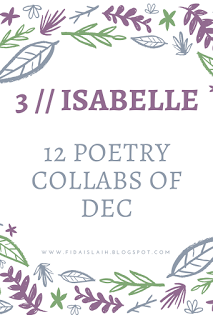
Dancing For Joy
Dancing with my friends, I discover my body:
I'm twirling under the lights,
electricity fuelled limbs
I watch their hips sway
arms pumping the air -
following along I am not as smooth,
but my smile fills the room,
hits the roof,
bounces off the ceiling
I was afraid of showing skin
my body always aches to feel whole
but I don’t feel it tonight
it’s all about seeing the joy in our eyes:
When I dance I am transcendent,
And in my laughter, I find self-love.
By Fida Islaih and Isabelle Kenyon
Isabelle has a poetry book published called 'This is not a Spectacle'.
Stay inspired,Fida
I hope you enjoy today's poem.

Dancing For Joy
Dancing with my friends, I discover my body:
I'm twirling under the lights,
electricity fuelled limbs
I watch their hips sway
arms pumping the air -
following along I am not as smooth,
but my smile fills the room,
hits the roof,
bounces off the ceiling
I was afraid of showing skin
my body always aches to feel whole
but I don’t feel it tonight
it’s all about seeing the joy in our eyes:
When I dance I am transcendent,
And in my laughter, I find self-love.
By Fida Islaih and Isabelle Kenyon
Isabelle has a poetry book published called 'This is not a Spectacle'.
Stay inspired,Fida
Published on December 07, 2017 07:13
December 4, 2017
Poetry Collaboration - Jen
Hello Poetteers,
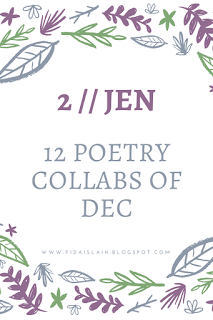
This poem was inspired after listening to Pink's "What About Us?" Enjoy!
I gave you a chance
I gave you my love, my trust
but you said so many things
so many things that turned out to be lies
I'm not taking it anymore
I'm ready to face this world
without you
and I'm okay with that
I have all the power in my heart
to change it all
I don't have to be afraid.
By Fida Islaih and Jennifer Rapp
Check out Jen's debut poetry book, Ink Stained Hands.
Stay inspired,
Fida

This poem was inspired after listening to Pink's "What About Us?" Enjoy!
I gave you a chance
I gave you my love, my trust
but you said so many things
so many things that turned out to be lies
I'm not taking it anymore
I'm ready to face this world
without you
and I'm okay with that
I have all the power in my heart
to change it all
I don't have to be afraid.
By Fida Islaih and Jennifer Rapp
Check out Jen's debut poetry book, Ink Stained Hands.
Stay inspired,
Fida
Published on December 04, 2017 09:00
December 1, 2017
Poetry Collaboration - Luna
Hello Poetteers,
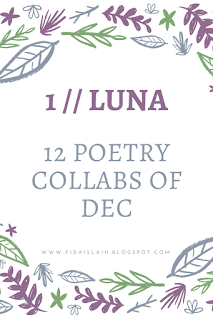
I feel like I've been slacking on the blog and decided on a project to bring the blog back to life. A little while ago I got to collaborate with Luna on a poem. Enjoy!
Stars
All bruised up
I look up at the stars
the sky is the same color
purple and black
I don't let the bruise bring me down
the way the purple gives into the night, making one feel closer
with the stars and the universe
I am a star among stars.
By Fida Islaih and Luna Margo Valentine
You can find Luna sharing original pieces of soft girl poetry over on twitter.
Stay inspired,
Fida

I feel like I've been slacking on the blog and decided on a project to bring the blog back to life. A little while ago I got to collaborate with Luna on a poem. Enjoy!
Stars
All bruised up
I look up at the stars
the sky is the same color
purple and black
I don't let the bruise bring me down
the way the purple gives into the night, making one feel closer
with the stars and the universe
I am a star among stars.
By Fida Islaih and Luna Margo Valentine
You can find Luna sharing original pieces of soft girl poetry over on twitter.
Stay inspired,
Fida
Published on December 01, 2017 06:13
November 2, 2017
The Length of Your Poetry
Hello Poetteers,
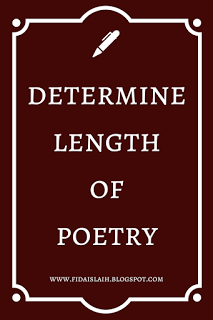
There are many different kinds of poetry books and different options on the length of them. Before compiling your own book, research the market for similar pieces to know what you are getting into. Some readers may read all the poems, but some won't. I have to confess that I sometimes skim poems. I usually go for shorter poems and smaller poetry collections. Something has to touch my heart for me to read longer pieces. I'm starting to gravitate towards the thicker poetry books.
The average length is 60 to 100 pages of poetry, sometimes 200 pages feel like a lot. I think it depends on how you read. Some people read from cover to cover and others will read a bit of it through a length of time. It depends on the type of the book:
20-30 for a chapbook50-80 for a full-length book200-300 pages are the max length. Be careful because it may seem too long.
It's about whatever the story and book require. Adjust where needed. The length and format of the individual poems matter too. You should be consistent. Have one poem per page.
The individual poems I write are usually shorter pieces. I can’t force myself to write longer pieces unless I feel there is more to the story and the story calls for it. Sometimes it may seem like a ramble if too long. I think my poems in short spurts. And I write several in one sitting. Eventually, I may have many similar pieces. I'll edit them and combine them together.
It will come up later if a poem needs a change in story or length. The length or edits of a poem will eventually show itself. Just like when you have a poetry idea that you haven't written or a poem you haven't finished. For example, I have two poetry ideas. One is a poem about foreign language and another is about sunflowers. I noticed throughout the month I have been seeing signs to write the poem. Whether it's reading other poems about sunflowers or every other week I'm writing different parts of the language poem without thinking of the past pieces I've written (I know this because I have a tracking system for my poems).
Comment: What is the average length of your poems? Do you prefer shorter or longer pieces?
Stay inspired,
Fida

There are many different kinds of poetry books and different options on the length of them. Before compiling your own book, research the market for similar pieces to know what you are getting into. Some readers may read all the poems, but some won't. I have to confess that I sometimes skim poems. I usually go for shorter poems and smaller poetry collections. Something has to touch my heart for me to read longer pieces. I'm starting to gravitate towards the thicker poetry books.
The average length is 60 to 100 pages of poetry, sometimes 200 pages feel like a lot. I think it depends on how you read. Some people read from cover to cover and others will read a bit of it through a length of time. It depends on the type of the book:
20-30 for a chapbook50-80 for a full-length book200-300 pages are the max length. Be careful because it may seem too long.
It's about whatever the story and book require. Adjust where needed. The length and format of the individual poems matter too. You should be consistent. Have one poem per page.
The individual poems I write are usually shorter pieces. I can’t force myself to write longer pieces unless I feel there is more to the story and the story calls for it. Sometimes it may seem like a ramble if too long. I think my poems in short spurts. And I write several in one sitting. Eventually, I may have many similar pieces. I'll edit them and combine them together.
It will come up later if a poem needs a change in story or length. The length or edits of a poem will eventually show itself. Just like when you have a poetry idea that you haven't written or a poem you haven't finished. For example, I have two poetry ideas. One is a poem about foreign language and another is about sunflowers. I noticed throughout the month I have been seeing signs to write the poem. Whether it's reading other poems about sunflowers or every other week I'm writing different parts of the language poem without thinking of the past pieces I've written (I know this because I have a tracking system for my poems).
Comment: What is the average length of your poems? Do you prefer shorter or longer pieces?
Stay inspired,
Fida
Published on November 02, 2017 05:00
October 30, 2017
Keep A Positivity File
Hello Poetteers,
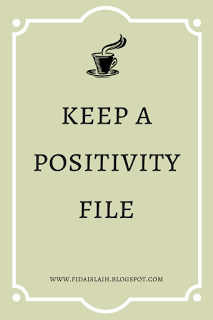
We all should have a document filled with our favorite quotes, poem, etc to read whenever you are feeling down. Keep all the compliments and good reviews to read whenever you are doubting yourself or read a bad review.
This will encourage you to see the best and keep going. It will remind you that you are doing well, on the right path. that you know what you are doing. It will rid of feeling like an imposter. (how I deal with the imposter syndrome).
It may be slow but you are building something out of nothing, with your own hands. I hope after this, you create a positivity file for yourself. Pay it forward by complimenting someone or leaving a positive review of their work.
stay inspired,
Fida
For more tips and pep talks, join my free newsletter.

We all should have a document filled with our favorite quotes, poem, etc to read whenever you are feeling down. Keep all the compliments and good reviews to read whenever you are doubting yourself or read a bad review.
This will encourage you to see the best and keep going. It will remind you that you are doing well, on the right path. that you know what you are doing. It will rid of feeling like an imposter. (how I deal with the imposter syndrome).
It may be slow but you are building something out of nothing, with your own hands. I hope after this, you create a positivity file for yourself. Pay it forward by complimenting someone or leaving a positive review of their work.
stay inspired,
Fida
For more tips and pep talks, join my free newsletter.
Published on October 30, 2017 05:00
October 24, 2017
Keep Your Edits Organized
Hello Poetteers,
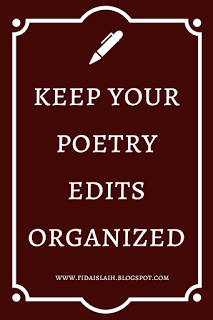
Poetry is messy, in good and bad ways. I like to stay organized or my mind will feel chaotic. Also, you can look back at when you wrote specific poems to see where you’re mind was at. You intentionally don't want to repeat old poems but there will be moments of serendipity.
Use track changes when editing your poem. In the document name say whether it’s a draft, edited or final copy. Or maybe have all the versions of the poem in one doc. Have another file for scraps of poems you didn’t use. Maybe electronic is not your thing and you print it out. Use a different colored pen to write in the margins. Use excel to keep track of when you wrote the poem, when you edited and how many times, when you shared or published it. Keep a checklist of how to edit your poem to use each time. Bonus: How to organize your poetry book.
Are your edits organized?
Join my newsletter for a free editing checklist.
Stay inspired,
Fida

Poetry is messy, in good and bad ways. I like to stay organized or my mind will feel chaotic. Also, you can look back at when you wrote specific poems to see where you’re mind was at. You intentionally don't want to repeat old poems but there will be moments of serendipity.
Use track changes when editing your poem. In the document name say whether it’s a draft, edited or final copy. Or maybe have all the versions of the poem in one doc. Have another file for scraps of poems you didn’t use. Maybe electronic is not your thing and you print it out. Use a different colored pen to write in the margins. Use excel to keep track of when you wrote the poem, when you edited and how many times, when you shared or published it. Keep a checklist of how to edit your poem to use each time. Bonus: How to organize your poetry book.
Are your edits organized?
Join my newsletter for a free editing checklist.
Stay inspired,
Fida
Published on October 24, 2017 05:00
October 20, 2017
What Are Poetry Genres?
Hello Poetteers,
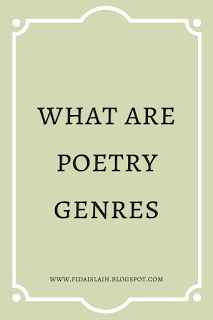
Genre means the type of art, literature or music characterized by a specific form, content, and style. Poetry genres are any literary genres like sci-fi, fantasy, etc. While researching I found this: “three major genres: epic poetry, lyric poetry, and dramatic poetry, treating comedy and tragedy as subgenres of dramatic poetry."
Poetry falls under two categories: classic and contemporary. I think the poetry genre I write is narrative. Narrative poetry is a form of poetry that tells a story, often making the voices of a narrator and characters as well; the entire story is usually written in metered verse. Narrative poems do not have to follow rhythmic patterns. Narrative poetry can be broken down into different themes like culture, faith, experiences, love, nature. If there is someone out there who better understands poetry genres, let me know if I’m correct or not. I want to try writing more dark poems, fantasy poems, and humorous poems.
Here are a couple questions to ask yourself when figuring out your poetry genre:
What are your poems about?How do your poems feel?What pattern, rhyme or form do your poems follow?Stay inspired,Fida

Genre means the type of art, literature or music characterized by a specific form, content, and style. Poetry genres are any literary genres like sci-fi, fantasy, etc. While researching I found this: “three major genres: epic poetry, lyric poetry, and dramatic poetry, treating comedy and tragedy as subgenres of dramatic poetry."
Poetry falls under two categories: classic and contemporary. I think the poetry genre I write is narrative. Narrative poetry is a form of poetry that tells a story, often making the voices of a narrator and characters as well; the entire story is usually written in metered verse. Narrative poems do not have to follow rhythmic patterns. Narrative poetry can be broken down into different themes like culture, faith, experiences, love, nature. If there is someone out there who better understands poetry genres, let me know if I’m correct or not. I want to try writing more dark poems, fantasy poems, and humorous poems.
Here are a couple questions to ask yourself when figuring out your poetry genre:
What are your poems about?How do your poems feel?What pattern, rhyme or form do your poems follow?Stay inspired,Fida
Published on October 20, 2017 06:23
October 17, 2017
Keep Track of Your Poetry
Hello Poetteers,
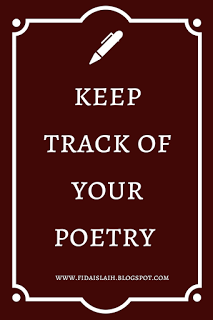
I noticed several of you are having trouble keeping track of your work. Poems scattered everywhere. It can be a bad thing or a good thing. You can find it later and surprise yourself with what you wrote or look at them differently. Either way, don't throw away your older poems.
One way to keep your poems organized is to keep it together by theme. I organize my poems by months they were written in.
I love using excel for my business stats. You can use it to keep track of the poems you have by title, date written and whether you shared it or not. Also on excel, you can add another tab for submissions. List where it's submitted, when, and what the response was. Or check out these resources, Submittable or Duotrope.
I have a writing folder on my desktop with subfolders:
Ideas
Month
Theme
Or when I was researching tips to organize poetry I found a writer that kept these subfolders:
Ideas
In Progress
Completed Works
Journals and Free-writes
Feedback
Submissions
Research
Be sure to check out this source I found the above information at for even more tips. I suggest also have folders for templates, prompts, and inspiration. What folders do you have for writing?
Stay inspired,Fida
Join my free newsletter for more poetry tips.

I noticed several of you are having trouble keeping track of your work. Poems scattered everywhere. It can be a bad thing or a good thing. You can find it later and surprise yourself with what you wrote or look at them differently. Either way, don't throw away your older poems.
One way to keep your poems organized is to keep it together by theme. I organize my poems by months they were written in.
I love using excel for my business stats. You can use it to keep track of the poems you have by title, date written and whether you shared it or not. Also on excel, you can add another tab for submissions. List where it's submitted, when, and what the response was. Or check out these resources, Submittable or Duotrope.
I have a writing folder on my desktop with subfolders:
Ideas
Month
Theme
Or when I was researching tips to organize poetry I found a writer that kept these subfolders:
Ideas
In Progress
Completed Works
Journals and Free-writes
Feedback
Submissions
Research
Be sure to check out this source I found the above information at for even more tips. I suggest also have folders for templates, prompts, and inspiration. What folders do you have for writing?
Stay inspired,Fida
Join my free newsletter for more poetry tips.
Published on October 17, 2017 05:37
October 13, 2017
Left Bare On Stage
Hello Poetteers,
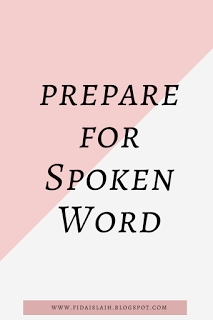
Poetry is not just something that is written. It can be something you perform. Practice is always recommended but when you're in the moment, it may still be shaky. Practice will help you get comfortable, confident and know your piece. I practice the words, not the emotion and emphasis. When it should be both. The nervousness gets in the way. That's something I need to work on. For example, you have an angry slam poem & since you're nervous, the anger isn't really there when you perform it. It's okay if you can't memorize the piece but do try. Have a copy of the poem with you on stage. Practice every day, three times a day, aloud, keep looking up to make eye contact. Practice in front of friends like it's the actual thing before the actual performance.
There will most likely be other poets performing, sit back and listen, observe the crowd, and just take in the moment. Let yourself feel the nerves, but don't let it consume you. Feel excited for your performance and for the others. I think it's good to not get caught up in the expectations of what's to come. I have done a few poetry readings and events. Arrive early. Get a sense of your surroundings, talk with the organizer and guests. We have an ideal setting that we would like to perform at. Hopefully, it feels casual, comfy, calm, quiet, dim lights, snaps as they hear lines that touch them. There is a mic for you to use. I prefer small crowds. There is something about not fully seeing their faces but knowing they are there. You can't have it all exactly, but it's good to look for places that will provide something similar. You want it to be welcoming and encouraging.
When going to an open mic night or any poetry event remember to bring a copy of the poem you're performing.BooksBusiness cardsWater PenA friend
Stay inspired,
Fida
For more like this, join my free newsletter.

Poetry is not just something that is written. It can be something you perform. Practice is always recommended but when you're in the moment, it may still be shaky. Practice will help you get comfortable, confident and know your piece. I practice the words, not the emotion and emphasis. When it should be both. The nervousness gets in the way. That's something I need to work on. For example, you have an angry slam poem & since you're nervous, the anger isn't really there when you perform it. It's okay if you can't memorize the piece but do try. Have a copy of the poem with you on stage. Practice every day, three times a day, aloud, keep looking up to make eye contact. Practice in front of friends like it's the actual thing before the actual performance.
There will most likely be other poets performing, sit back and listen, observe the crowd, and just take in the moment. Let yourself feel the nerves, but don't let it consume you. Feel excited for your performance and for the others. I think it's good to not get caught up in the expectations of what's to come. I have done a few poetry readings and events. Arrive early. Get a sense of your surroundings, talk with the organizer and guests. We have an ideal setting that we would like to perform at. Hopefully, it feels casual, comfy, calm, quiet, dim lights, snaps as they hear lines that touch them. There is a mic for you to use. I prefer small crowds. There is something about not fully seeing their faces but knowing they are there. You can't have it all exactly, but it's good to look for places that will provide something similar. You want it to be welcoming and encouraging.
When going to an open mic night or any poetry event remember to bring a copy of the poem you're performing.BooksBusiness cardsWater PenA friend
Stay inspired,
Fida
For more like this, join my free newsletter.
Published on October 13, 2017 05:00
October 10, 2017
10 Mistakes Poets Are Making
Hello Poetteers,
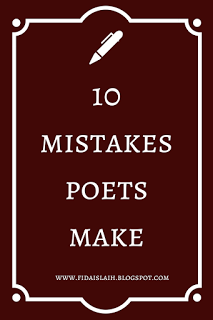
As I write and share my poetry I've noticed a few mistakes poets have made.
Leaving their name out of their poetry graphic. With leaving out your name, you make it easier for someone to take it and call it their own. Adding your name will make it harder for your work to be plagiarized. It will make it easier for readers to find more of your work. Not keeping track of and organizing their poetry. Without an organization system, you may forget your ideas or end up rewriting or resharing an old poem. Not adding their book on Goodreads. Goodreads is a place where readers keep track of what they read and their book reviews. (Goodreads tutorial).Believing rhyme words is what makes a good poem. Rhyme words is a bonus to a good poem. A poem is a piece of writing that shares emotion in a concise way. Fighting and pushing away learning and writing poetry. I first learned poetry through structure and didn't like it. Later I was taught poetry through free verse and it changed my mind. Thinking their poem needs to be in a format. Forms may limit the thoughts you want to write. Throwing away old poems. By keeping your poems you can see your growth. Not checking for grammar, punctuation or any poetic devices. The smallest things can change what you wanted the poem to be. Being vague in their writing. Sometimes I read someone's writing and it feels like anyone can write it. Share your own experience.Writing poetry for other people and not for yourself. Nothing else needs to be said.
Bonus: I've seen people share all their poems and other people not share their poetry at all. Have a balance of sneak peeks and mystery as you publish your book.
Stay inspired,
Fida

As I write and share my poetry I've noticed a few mistakes poets have made.
Leaving their name out of their poetry graphic. With leaving out your name, you make it easier for someone to take it and call it their own. Adding your name will make it harder for your work to be plagiarized. It will make it easier for readers to find more of your work. Not keeping track of and organizing their poetry. Without an organization system, you may forget your ideas or end up rewriting or resharing an old poem. Not adding their book on Goodreads. Goodreads is a place where readers keep track of what they read and their book reviews. (Goodreads tutorial).Believing rhyme words is what makes a good poem. Rhyme words is a bonus to a good poem. A poem is a piece of writing that shares emotion in a concise way. Fighting and pushing away learning and writing poetry. I first learned poetry through structure and didn't like it. Later I was taught poetry through free verse and it changed my mind. Thinking their poem needs to be in a format. Forms may limit the thoughts you want to write. Throwing away old poems. By keeping your poems you can see your growth. Not checking for grammar, punctuation or any poetic devices. The smallest things can change what you wanted the poem to be. Being vague in their writing. Sometimes I read someone's writing and it feels like anyone can write it. Share your own experience.Writing poetry for other people and not for yourself. Nothing else needs to be said.
Bonus: I've seen people share all their poems and other people not share their poetry at all. Have a balance of sneak peeks and mystery as you publish your book.
Stay inspired,
Fida
Published on October 10, 2017 05:00



